#research lab in India
Explore tagged Tumblr posts
Text
Chemzin Biotox - Innovative Research Laboratory in India
Chemzin Biotox is a research lab in India that does testing for a wide range of industries like Preclinical, In-Vivo Toxicology, Pharma, & cell testing. Call Now!
2 notes
·
View notes
Text

Precision-Driven Solutions for the Pharma & Chemical Industry We excel in Pharma, Agro, Fine & Specialty Chemicals, CRO, and CDMO sectors, delivering tailored synthesis solutions backed by extensive global partnerships. Our focus on innovation, production efficiency, and market strategy drives industry-leading results.
#bioscience#OctaneX Labs#API clinical trial management system#intermediates manufacturers#chemicals API#fine chemical#synthesis#CDMO Companies#CDMO India#life science chemicals#pharmaceutical fine chemicals#capsules#chemicals#cro#cdmo#cdmo companies in india#cdmo services#science#chemical synthesis#chemistry#healthcare#cro services#speciality chemicals#fine chemistry#contract research#pharma company#pharma#pharmaceutical#big pharma#cro ind
0 notes
Text
#bloomberg lab#financial research analyst course in india#nl dalmia institute#nl dalmia pgdm#nldimsr mumbai#pgdm course
0 notes
Text
#laboratory equipment supplier in india#laboratory instruments#labindia instruments#marketing#geology#Food research instruments#lab Agricultural instruments#Environmental research instruments#lab equipments#laboratory equipment manufacturer#Laboratory Equipment Manufacturer
0 notes
Text
Tobii Pro Eye Tracking Tools & Software for Scientific Research, India
Authorized Reseller, Dealer & Distributor of Tobii Pro Eye Tracking Equipments, Tobii Pro Eye Tracking Glasses and Tobii Pro Eye Tracker for Scientific Research, Mumbai, India.
Eye Tracker, Tobii Pro Eye Tracker, Eye Tracker software, Eye Tracking Device, Eye Tracking Controls, Tobii Pro Eye Tracking Device, Tobii Pro, Tobii Pro Glasses 3 Eye Tracker, Tobii Pro Nano Eye Tracker, Tobii Pro Fusion Eye Tracker, Tobii Pro Spectrum Eye Tracker Hardware, Tobii Pro Lab Software, MTA Eye Tracker, Mobile Testing Accessory, Tobii Pro Eye Tracking Equipments, Tobbi Pro Eye Tracking Equipments for Scientific Research, Reseller, Dealer, Distributor, Mumbai, India.
#Eye Tracker#Tobii Pro Eye Tracker#Eye Tracker software#Eye Tracking Device#Eye Tracking Controls#Tobii Pro Eye Tracking Device#Tobii Pro#Tobii Pro Glasses 3 Eye Tracker#Tobii Pro Nano Eye Tracker#Tobii Pro Fusion Eye Tracker#Tobii Pro Spectrum Eye Tracker Hardware#Tobii Pro Lab Software#MTA Eye Tracker#Mobile Testing Accessory#Tobii Pro Eye Tracking Equipments#Tobbi Pro Eye Tracking Equipments for Scientific Research#Reseller#Dealer#Distributor#Mumbai#India.
0 notes
Text
We achieved our primary objectives of meeting clients and prospects
We achieved our primary objectives of meeting clients and prospects @neosciencehub #sciencenews #neosciencehub #IndiaLabExpo2024 #analyticaanacon #biotechnology #
In this engaging interview with Rashmi Kumari of Neo Science Hub, Dr. Narasimha Murthy Bhatta, Director of Scientific Research Instruments Co Pvt Ltd (SRiCo), shares his insights on the company’s participation at Analytica Anacon India 2024 and the growing demand for advanced laboratory equipment in India. With over 11 years of leadership experience at SRiCo, Dr. Bhatta highlights the company’s…
#Analytica Anacon India 2024#featured#Hyderabad#India Lab Expo 2024#sciencenews#Scientific Research Instruments Co Pvt Ltd (SRiCo)
0 notes
Text

https://irmri.org/rubber-technology-lms.html Ready to take your rubber technology & training to the next level? Find our complete rubber technology & LMS for keeping knowledge, Click here today!
0 notes
Text
Space Technology Opportunity in India
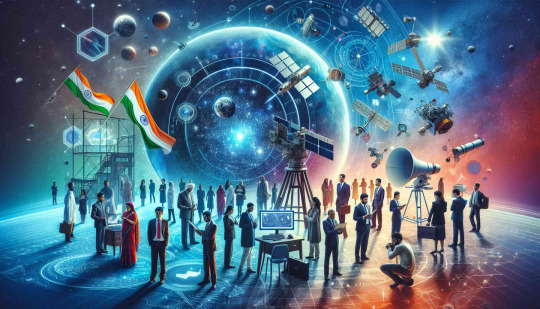
Written By: Jagriti Shahi
Introduction:
Entrepreneurship in space technology in India has been gaining momentum in recent years. The Indian government has been actively promoting the development of the space sector, and private companies are playing an increasingly important role.

As the nation liberalizes its space sector, a diverse array of players are contributing to the burgeoning space ecosystem. Entrepreneurs are venturing into satellite manufacturing, pushing the boundaries of launch services, delving into space exploration, and exploring innovative solutions for satellite-based communication. The landscape is further enriched by collaborative efforts between private entities, government agencies, and academic institutions, fostering a dynamic environment for research and development.
In this context, it's crucial to explore the challenges and opportunities that define the entrepreneurial spirit in India's space technology sector. Regulatory hurdles, infrastructure development, and the need for sustained investments are among the challenges that entrepreneurs face. However, with increasing investor interest, a robust policy framework, and a commitment to fostering innovation, India's entrepreneurial ventures in space technology are poised to shape the nation's narrative in the cosmic domain. This dynamic interplay of public and private entities is not only propelling India's space capabilities but is also contributing to the global discourse on the commercialization and exploration of space.
Here are some key aspects of entrepreneurship in space technology in India:
Government Initiatives:New Space Policy: The Indian government has introduced policies to encourage private sector participation in space activities. The New Space India Limited (NSIL) was established to promote, commercially exploit, and transfer technologies developed by the Indian Space Research Organisation (ISRO).Liberalization: The government has liberalized the space sector, allowing private companies to undertake a wide range of space-related activities, including satellite launches, space exploration, and satellite communication services. (ISRO) Initiatives: Antrix Corporation: Antrix is the commercial arm of ISRO, and it collaborates with private players for the commercialization of space-related products and services.: SEED is a program initiated by ISRO to promote startups in the space sector by providing them with opportunities for collaboration and technology transfer.: NSIL is a central public sector enterprise (CPSE) under the Department of Space. It plays a crucial role in commercializing space products, technical consultancy services, and transfer of technologies.: ISRO has been actively engaging with startups, providing them access to its facilities, expertise, and technology.: The Department of Space in India oversees the country's space program. It may introduce schemes and programs to support space technology startups and entrepreneurs. (AIM): AIM, a flagship initiative of the NITI Aayog, supports innovation and entrepreneurship in various sectors. It may have programs and funding opportunities that space technology startups can explore. (NIF): NIF supports grassroots innovations and may provide support to startups working on innovative space technologies.
Private Space Companies:Startups: Several startups in India are focusing on various aspects of space technology. Some are involved in satellite manufacturing, launch services, data analytics from space, and more.Launch Services: Companies like Agnikul Cosmos, Skyroot Aerospace, and Pixxel are working on developing small satellite launch vehicles to provide cost-effective and flexible launch options.
Space Exploration and Research: Interplanetary Missions: ISRO has been actively involved in space exploration, and private companies are expressing interest in participating in future interplanetary missions.Research and Development: Private entities are engaging in research and development activities, contributing to advancements in satellite technology, propulsion systems, and other space-related technologies.
Satellite Manufacturing:Private Satellite Manufacturers: Companies like Exseed Space and Bellatrix Aerospace are involved in the manufacturing of satellites, catering to various purposes such as communication, Earth observation, and scientific research.
Communication Services:Telecommunication Satellites: Private companies are exploring opportunities to provide satellite-based communication services. This includes both broadband internet services and other communication solutions.
Funding and Investments:Investor Interest: The space technology sector in India has attracted attention from investors. Funding rounds for space startups have been on the rise, indicating confidence in the potential growth of the industry.
Collaborations and Partnerships:
Industry-Academia Collaboration: Partnerships between private companies, government organizations, and academic institutions are fostering innovation and research in the space sector.
The Indian space technology ecosystem is evolving, and with continued government support, entrepreneurial ventures in space technology are expected to play a crucial role in shaping the future of the Indian space industry.
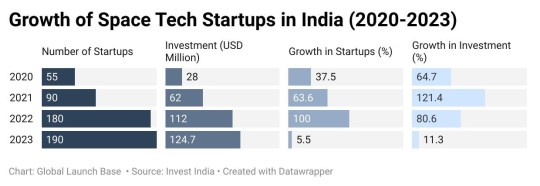
The number of space tech startups in India has witnessed explosive growth, increasing by almost five times in just five years. Investments in the sector have also seen a sharp rise, from $17 million in 2019 to an estimated $124.7 million in 2023.
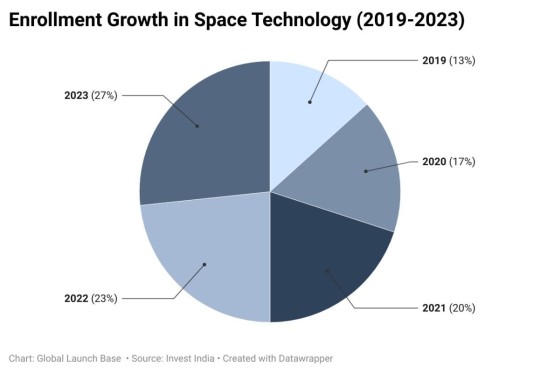
Commercialization of Space Activities: With India's proven track record in satellite launches and space technology, there is a substantial potential for the commercialization of space activities. The burgeoning demand for satellite-based services, including communication, arth observation, and navigation, opens up opportunities for private entities to actively participate in the space industry. As the cost of space access continues to decrease, private companies can explore ventures such as satellite manufacturing, space tourism, and satellite-based applications, contributing to economic growth and job creation.
International Collaborations: Collaborations with other space-faring nations present a promising avenue for India to augment its space capabilities. Joint ventures, knowledge exchange, and technology transfer can accelerate innovation and enhance the efficiency of space missions. ISRO has already established itself as a reliable partner for international launches, and expanding collaborative efforts can lead to shared resources, reduced costs, and a more diversified approach to space exploration. As India continues to engage in global partnerships, it can leverage collective expertise for ambitious endeavors beyond Earth's orbit.
Innovation in Space Technology: Investments in research and development (R&D) can catapult India into the forefront of space innovation. Emphasis on cutting-edge technologies such as artificial intelligence, advanced materials, and propulsion systems can revolutionize space missions. The development of reusable launch vehicles, like the ongoing efforts in creating a Reusable Launch Vehicle (RLV), can significantly reduce launch costs, making space exploration more sustainable. Encouraging a culture of innovation, fostering collaboration between academia and industry, and providing incentives for R&D initiatives can fuel breakthroughs in space technology.
Space Applications for Sustainable Development: Leveraging space technology for sustainable development on Earth is an untapped frontier. Utilizing satellite data for precision agriculture, disaster management, environmental monitoring, and resource mapping can contribute to addressing pressing global challenges. By integrating space-based solutions into sectors such as agriculture, healthcare, and urban planning, India can harness the power of space technology for inclusive and sustainable development, bringing tangible benefits to its citizens and contributing to global initiatives.
Expansion of Interplanetary Exploration: Building on the success of Mars Orbiter Mission (Mangalyaan), India has the potential to expand its interplanetary exploration efforts. Initiatives for exploring other celestial bodies, such as Venus or asteroids, can contribute to humanity's understanding of the solar system and beyond. A strategic focus on ambitious interplanetary missions can position India as a key player in the broader scientific community and foster international collaboration in the exploration of the cosmos.
Trending Technologies in India's Space Industry:
Nanotechnology: The integration of nanotechnology in space technology has the potential to revolutionize spacecraft design, materials, and instrumentation. Nanosatellites, with their miniaturized components, are becoming increasingly popular for cost-effective and innovative space missions. India can leverage nanotechnology for lightweight yet robust spacecraft, enhancing mission efficiency and scientific capabilities.
Companies: Nano-Tech SpA, Kalva Nanotech
Artificial Intelligence (AI) and Machine Learning (ML): AI and ML are playing a pivotal role in data analysis, image processing, and autonomous decision-making in space missions. India can explore AI applications for real-time data interpretation, automated navigation, and predictive maintenance of spacecraft. Incorporating machine learning algorithms into Earth observation data analysis can significantly enhance the understanding of environmental changes.
Companies: Aadyah Aerospace, Blue Sky Analytics
Quantum Computing: Quantum computing holds the promise of solving complex computational problems beyond the capabilities of classical computers. In the space sector, quantum computing can be utilized for optimizing mission trajectories, simulating quantum systems, and enhancing the security of communication channels. India's focus on quantum computing research can contribute to advancements in space-related computations.
Companies: QpiAI, BosonQ
3D Printing/Additive Manufacturing: The adoption of 3D printing in space technology can revolutionize the manufacturing process, enabling the production of complex and lightweight structures. India can benefit from 3D printing for rapid prototyping, cost-effective manufacturing of satellite components, and even on-demand production during long-duration space missions.
Companies: Agnikul Cosmos, EOS India
Blockchain Technology: Blockchain technology offers secure and transparent data management, making it applicable to space-based applications such as satellite communication, data storage, and secure information sharing. By incorporating blockchain, India can enhance the security and integrity of space-related data and transactions.
Companies: SpaceTime Labs, Aryaka Networks
Solar Sail Technology: Solar sails, propelled by the pressure of sunlight, offer a sustainable and efficient means of propulsion for spacecraft. This technology can be harnessed for deep-space exploration, enabling missions to travel vast distances with minimal fuel requirements. India's exploration programs can benefit from research and development in solar sail technology for extended-duration missions.
Companies: Indian Institute of Space Science and Technology (IIST), IIT Bombay - Aerospace Engineering Department
Hyperspectral Imaging: Hyperspectral imaging involves capturing a wide range of wavelengths in the electromagnetic spectrum. This technology is instrumental in Earth observation, resource mapping, and environmental monitoring. India can explore the integration of hyperspectral imaging in its satellite payloads for enhanced remote sensing capabilities.
Companies: Pixxel, Paras Defence & Space Technologies Ltd
Internet of Things (IoT) for Space: The application of IoT in space technology involves connecting devices and sensors on satellites and spacecraft to gather and transmit data. This interconnected network can facilitate efficient communication, data collection, and collaborative decision-making during space missions. India can explore IoT applications for enhanced space situational awareness and mission coordination.
Companies: Agnikul Cosmos
As India looks to the future, embracing these trending technologies will be crucial for maintaining its competitive edge in space exploration and satellite technology. By actively incorporating these innovations into its space programs, India can not only enhance mission success but also contribute to the global advancement of space technology. Collaborations with research institutions, startups, and the private sector will play a vital role in driving these technological advancements in India's space industry.
Challenges and the Way Forward:
Despite its successes, India's space program faces challenges such as increased competition, budget constraints, and the need for continuous innovation. To overcome these challenges, sustained government support, collaboration with private entities, and a focus on skill development in the space sector are crucial.
Increased Global Competition: The space industry is becoming increasingly competitive with the emergence of new players and the commercialization of space activities. To stay ahead, India must continuously innovate, streamline its processes, and invest in cutting-edge technologies. Developing a robust ecosystem for space startups and fostering public-private partnerships can enhance India's competitiveness in the global space market.
Budget Constraints: Despite commendable achievements, budget constraints pose a challenge for sustaining and expanding India's space endeavors. A consistent and increased allocation of funds to ISRO, along with exploring innovative funding mechanisms, will be crucial. Engaging with the private sector for joint ventures and commercial space activities can help alleviate financial constraints and promote economic sustainability in the long run.
Human Resource Development: The growth of India's space program necessitates a skilled workforce capable of handling complex missions. Investing in education and training programs in collaboration with academic institutions can ensure a steady supply of skilled professionals in fields such as aerospace engineering, astrophysics, and data sciences. This will not only address the current workforce requirements but also fuel future innovations in space technology.
Technological Advancements: Rapid technological advancements globally require India to stay at the forefront of innovation. Embracing emerging technologies such as artificial intelligence, quantum computing, and advanced propulsion systems will be essential. Establishing research and development centers dedicated to space technology innovation can facilitate the integration of these advancements into future missions.
Space Debris Management: The increasing number of satellites and space missions contribute to the growing issue of space debris. India needs to actively participate in international efforts to address space debris management, adopting sustainable practices in satellite design and end-of-life disposal. Research into debris removal technologies and international collaboration on space traffic management will be pivotal in ensuring the long-term sustainability of space activities.
Climate Change Monitoring: With the rising global concerns about climate change, space technology plays a crucial role in monitoring environmental indicators. India can take a leadership role in developing satellite-based solutions for climate monitoring, disaster response, and sustainable resource management. This requires a dedicated focus on Earth observation satellites, advanced sensors, and data analytics.
Enhanced Space Diplomacy: Strengthening space diplomacy is essential for India to expand its global influence in the space arena. Engaging in collaborative space missions, sharing scientific knowledge, and participating in international forums will enhance India's standing as a responsible space-faring nation. Forming strategic partnerships with countries interested in space exploration can open up new avenues for cooperation and joint missions.
Conclusion:
India's journey in space technology has been nothing short of remarkable, with ISRO consistently pushing the boundaries of innovation. As the nation continues to invest in space exploration, the opportunities for growth, collaboration, and technological advancements are boundless. The future holds exciting possibilities for India's space technology sector, positioning the country as a key player in the global space community.
About Global Launch Base:
Global Launch Base helps international startups expand in India. Our services include market research, validation through surveys, developing a network, building partnerships, fundraising, and strategy revenue growth. Get in touch to learn more about us.
Contact Info:
Website: www.globallaunchbase.com
LinkedIn: https://www.linkedin.com/company/globallaunchbase/
Email: [email protected]
#ISRO - Indian Space Research Organization#NewSpace India Limited (NSIL)#SEED(Social Entrepreneurship Empowerment Development)#Atal Innovation Mission Official#National Innovation Foundation - India#Nano-Tech SpA#Kalva Nanotech#AADYAH Aerospace Private Limited#Blue Sky Analytics#QpiAI#BosonQ Psi (BQP)#AgniKul Cosmos#EOS#Spacetime Labs#Aryaka#Indian Institute of Space Science and Technology#Aerospace Engineering Association IIT Bombay#Pixxel#Paras Defence & Space Technologies Ltd.#AgniKul Cosmos hashtag#SpaceTechnologyInIndia hashtag#IndianSpaceProgram hashtag#ISROOpportunities hashtag#SpaceIndustryGrowthIndia hashtag#SpaceResearchOrganizationsIndia hashtag#SatelliteTechnologyOpportunities hashtag#IndianSpaceExploration hashtag#ISROAchievements hashtag#SpaceScienceCareersIndia hashtag#SpaceTechnologyTrends hashtag
0 notes
Text

In Cosmetic Research And Development lab, cosmetic chemists experiment with their concepts and develop brand-new, interesting ones - Cosmetic Research Lab
#Cosmetic Research Lab#Cosmetics Testing Laboratory#Cosmetics Laboratories in India#Cosmetic Formulations of Skin Care Products
0 notes
Link
Lambda is capable of handling accurate, accessible and reproducible high-quality data through state-of-the-art technologies compliant with regulatory requirements. Lambda's Biometric services are anchored by BizNet® – Excellent regulatory compliant eCRF/EDC platform for paperless and efficient execution of projects and a highly skilled team of data managers, biostatisticians, statistical programmers. It also possesses CDISC (SDTM) datasets deliverables for submissions to regulatory markets such as USFDA.
0 notes
Text
The Best News of Last Week - March 18
1. FDA to Finally Outlaw Soda Ingredient Prohibited Around The World

An ingredient once commonly used in citrus-flavored sodas to keep the tangy taste mixed thoroughly through the beverage could finally be banned for good across the US. BVO, or brominated vegetable oil, is already banned in many countries, including India, Japan, and nations of the European Union, and was outlawed in the state of California in October 2022.
2. AI makes breakthrough discovery in battle to cure prostate cancer
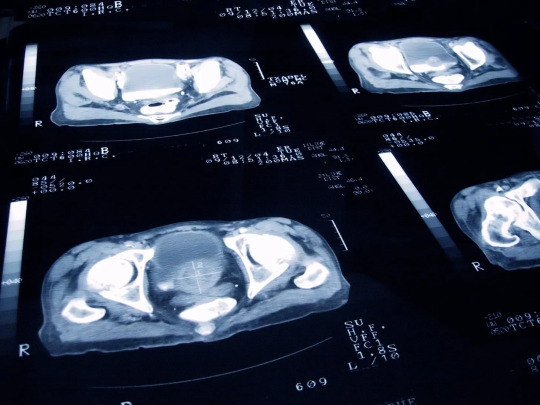
Scientists have used AI to reveal a new form of aggressive prostate cancer which could revolutionise how the disease is diagnosed and treated.
A Cancer Research UK-funded study found prostate cancer, which affects one in eight men in their lifetime, includes two subtypes. It is hoped the findings could save thousands of lives in future and revolutionise how the cancer is diagnosed and treated.
3. “Inverse vaccine” shows potential to treat multiple sclerosis and other autoimmune diseases
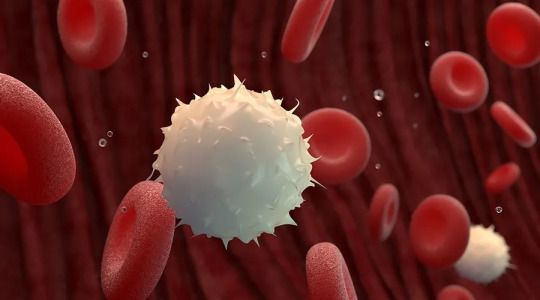
A new type of vaccine developed by researchers at the University of Chicago’s Pritzker School of Molecular Engineering (PME) has shown in the lab setting that it can completely reverse autoimmune diseases like multiple sclerosis and type 1 diabetes — all without shutting down the rest of the immune system.
4. Paris 2024 Olympics makes history with unprecedented full gender parity

In a historic move, the International Olympic Committee (IOC) has distributed equal quotas for female and male athletes for the upcoming Olympic Games in Paris 2024. It is the first time The Olympics will have full gender parity and is a significant milestone in the pursuit of equal representation and opportunities for women in sports.
Biased media coverage lead girls and boys to abandon sports.
5. Restored coral reefs can grow as fast as healthy reefs in just 4 years, new research shows
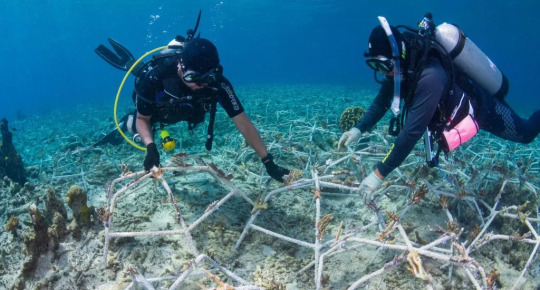
Planting new coral in degraded reefs can lead to rapid recovery – with restored reefs growing as fast as healthy reefs after just four years. Researchers studied these reefs to assess whether coral restoration can bring back the important ecosystem functions of a healthy reef.
“The speed of recovery we saw is incredible,” said lead author Dr Ines Lange, from the University of Exeter.
6. EU regulators pass the planet's first sweeping AI regulations

The EU is banning practices that it believes will threaten citizens' rights. "Biometric categorization systems based on sensitive characteristics" will be outlawed, as will the "untargeted scraping" of images of faces from CCTV footage and the web to create facial recognition databases.
Other applications that will be banned include social scoring; emotion recognition in schools and workplaces; and "AI that manipulates human behavior or exploits people’s vulnerabilities."
7. Global child deaths reach historic low in 2022 – UN report
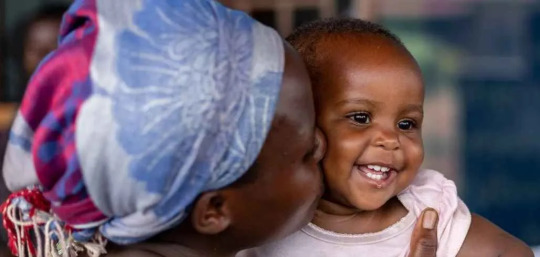
The number of children who died before their fifth birthday has reached a historic low, dropping to 4.9 million in 2022.
The report reveals that more children are surviving today than ever before, with the global under-5 mortality rate declining by 51 per cent since 2000.
---
That's it for this week :)
This newsletter will always be free. If you liked this post you can support me with a small kofi donation here:
Buy me a coffee ❤️
Also don’t forget to reblog this post with your friends.
782 notes
·
View notes
Text
Top Research Lab in Tricity - Chemzin Biotox Research Institute Pvt. Ltd

Chemzin Biotox Research Institute Pvt. Ltd. is the top research lab in Tricity. Our dedicated team of experts leads the way in scientific researches.
1 note
·
View note
Text

Elevating Chemical & Pharma Excellence Through Innovation Our expertise covers Pharma, Agro, Fine & Specialty Chemicals, CRO, and CDMO sectors, offering state-of-the-art synthesis solutions through strong global alliances. By prioritizing quality, research, efficiency, and strategic marketing, we ensure superior outcomes.
#bioscience#OctaneX Labs#API clinical trial management system#intermediates manufacturers#chemicals API#fine chemical#synthesis#CDMO Companies#CDMO India#life science chemicals#pharmaceutical fine chemicals#capsules#chemicals#cro#cdmo#cdmo companies in india#cdmo services#science#chemical synthesis#chemistry#healthcare#cro services#fine chemistry#contract research#cdmo lab#cdmo telangana company#pharma company#pharma#pharmaceutical#big pharma
0 notes
Text
Empower Your Financial Career With N. L. Dalmia’s Advanced Learning

In the fast-paced world of finance, professionals who can leverage cutting-edge tools and adapt to industry trends are in high demand. For aspiring financial experts, acquiring the right skills and certifications can pave the way for a rewarding career. This is where specialized courses like the financial research analyst course and advanced learning environments such as Bloomberg labs come into play, empowering individuals to stay ahead in the competitive landscape.
Bloomberg Lab: Revolutionizing Financial Education
The Bloomberg lab is a game-changer for finance education. This state-of-the-art platform provides real-time financial data, analytics and tools that professionals use in the industry. By immersing themselves in this technology, students gain hands-on experience in analyzing market trends, forecasting economic conditions and making informed investment decisions. Mastery of Bloomberg terminals equips learners with practical skills that bridge the gap between academic learning and industry expectations, ensuring they are job-ready from day one.
For those eyeing a career in financial research, exposure to a Bloomberg lab is indispensable. It allows students to understand market dynamics, study financial instruments and evaluate economic data with precision. Institutions that integrate Bloomberg labs into their curriculum provide a significant advantage to their students, making them more attractive to employers in top-tier organizations.
Financial Research Analyst Course: Building Expertise
The financial research analyst course is tailored to equip students with in-depth knowledge of financial markets, investment strategies and economic analysis. This specialized program delves into core areas such as equity research, portfolio management and financial modelling. By honing critical thinking and analytical skills, the course prepares learners to excel in roles like financial analysts, investment consultants and market strategists.
What sets this course apart is its focus on practical application. Students work on real-world financial scenarios, leveraging tools like the Bloomberg terminal to enhance their learning. This hands-on approach ensures that graduates are not only proficient in theoretical concepts but also adept at applying them in dynamic business environments. As financial markets grow more complex, the demand for trained research analysts continues to soar, making this course a stepping stone for a successful career in finance.
Executive PGDM: Accelerating Career Growth
For working professionals looking to advance their careers, an Executive PGDM program offers the perfect blend of academic rigor and practical insights. Designed to accommodate the busy schedules of executives, this program focuses on leadership development, strategic decision-making and industry-relevant skills. Participants benefit from case-based learning, industry interactions and exposure to global business trends, enabling them to take on senior management roles with confidence.
Moreover, Executive PGDM programs often integrate advanced technologies like Bloomberg labs, ensuring participants are well-versed in the latest tools used in financial analysis and decision-making. This combination of theoretical knowledge and hands-on experience makes graduates highly sought after in the corporate world.
Conclusion: Your Path to Excellence at N. L. Dalmia
N. L. Dalmia Institute of Management Studies and Research is at the forefront of delivering world-class education in finance and management. With access to cutting-edge facilities like the Bloomberg lab, specialized programs such as the financial research analyst course and a comprehensive Executive PGDM, the institute equips students and professionals with the skills they need to excel in the financial domain. Choosing N. L. Dalmia is not just a step forward in your academic journey; it is a leap towards a thriving career in the ever-evolving world of finance.
#financial research analyst course in india#executive pgdm#nldimsr mumbai#nl dalmia institute#nl dalmia pgdm#pgdm course#bloomberg lab
0 notes
Text
#laboratory equipment supplier in india#labindia instruments#laboratory instruments#geology#biology#laboratory equipment manufacturer#lab equipments#equipments#research instruments#Clinical Research
0 notes
Text
Tobii Pro Eye Tracking Tools for Marketing and User Research, India
Authorized Reseller, Dealer & Distributor of Tobii Pro Eye Tracker, Tobii Pro Eye Tracking Glasses and Tobii Pro Eye Tracking Software for Marketing and User Research, Mumbai, India.
Tobii Pro, Eye Tracker, Tobii Pro Eye Tracking Equipments, Eye Tracking Tools, Eye Tracking Tools for Marketing and User Research, Tobii Pro Eye Tracker Reseller, Tobii Pro Eye Tracker Dealer, Tobii Pro Eye Tracker Distributor, Tobii Pro Eye Tracking Glasses, Tobii Pro Eye Tracking Software, Tobii Pro Glasses 3 Eye Tracker, Tobii Pro Nano Eye Tracker, Tobii Pro Fusion Eye Tracker, Tobii Pro Spectrum Eye Tracker Hardware, Tobii Pro Lab Software, MTA Eye Tracker, Mobile Testing Accessory, Reseller, Dealer, Distributor, Mumbai, India.
#Tobii Pro#Eye Tracker#Tobii Pro Eye Tracking Equipments#Eye Tracking Tools#Eye Tracking Tools for Marketing and User Research#Tobii Pro Eye Tracker Reseller#Tobii Pro Eye Tracker Dealer#Tobii Pro Eye Tracker Distributor#Tobii Pro Eye Tracking Glasses#Tobii Pro Eye Tracking Software#Tobii Pro Glasses 3 Eye Tracker#Tobii Pro Nano Eye Tracker#Tobii Pro Fusion Eye Tracker#Tobii Pro Spectrum Eye Tracker Hardware#Tobii Pro Lab Software#MTA Eye Tracker#Mobile Testing Accessory#Reseller#Dealer#Distributor#Mumbai#India
0 notes